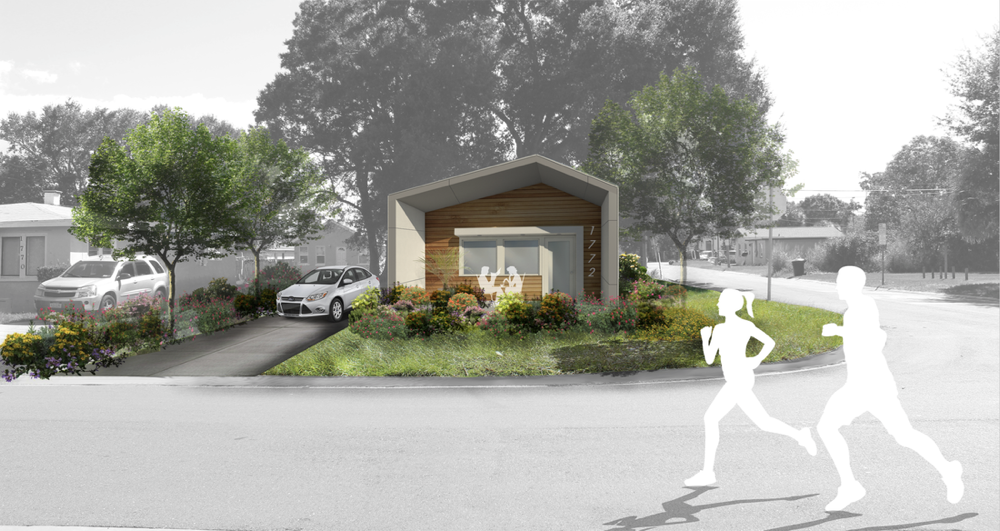Who isn’t in love with the adorable, cozy “tiny houses” that we see in magazines and on TV? They seem to speak to us of the peaceful, safe, homey things we wish for in our own crazy lives. Shelter from the storm. A place to lay our spinning heads. Freedom from debt, and a simpler lifestyle based on collecting experiences, not possessions.
For the homeless veteran, however, the concept of shelter takes on a whole new dimension. Permanent housing is a prerequisite for all other treatments and services a homeless person may need; health and socialization support systems simply are not effective until someone has a safe and permanent home.
Since its founding in 2007, Celebrate Outreach has been working to fulfill their mission of preventing and ending homelessness in our area, with a particular focus on homeless vets.
“We know,” said the organization’s treasurer, Irene Pavese, “That there is really no ‘us’ and ‘them’. There’s such a fine line between any of us and a catastrophe. St. Petersburg is in a wonderful growth phase, but the flip side of that is that affordable housing is disappearing.”
Celebrate Outreach’s membership and board are a small but dogged force who, according to their secretary, Sabine Von Aulock, “operate totally on the goodwill of volunteers and donors.”
One Tiny Home
So, ending homelessness for all? Impossible, right? Like any huge goal, it seems less formidable when broken down into individual tasks. Celebrate Outreach decided that they would begin with one tiny home for one homeless veteran.
Enter USF Professor of Architecture Josue Robles Caraballo, a citizen of the world with a holistic view of housing, years of expertise, irrepressible enthusiasm, and—students! In the summer of 2017, Robles designed a course at USF Tampa with the goal of turning Celebrate Outreach’s tiny home vision into reality.
Robles calls his group of 16 students “a huge source of creativity, original thinking and energy.” Coming from various countries, they brought global perspectives on housing—such as, “What is a living room?”— which challenged conventional uses of space. Two of the students are veterans themselves, and one who uses a wheelchair.
“He was our reality-checker,” Robles said. “He kept us honest. It is great for future architects to be involved in this socially charged project. They’re working in a real-world setting”.
While Celebrate Outreach continued to work on fundraising and providing weekly Saturday breakfasts and Friday dinners for the homeless, Robles and his class at USF brainstormed a model for the house. They began with 48 ideas, ranging from shipping containers to 3D-printed models. Finally, there were four models left standing, with one in particular leading the pack.
The real challenge was turning a 500-square-foot dwelling into a home, says Robles: “These had to be homes that you or I could live in. Full kitchens and full bathrooms, plenty of natural light…historically comfortable elements like a front porch. They had to be designed to fit into the neighborhood they would occupy, and also be something that would please the neighbors.”
Meanwhile, a limited budget meant that they had to get creative. The students focused their energy on affordable materials of good quality, ease of maintenance and compliance with ADA standards for disabled folk. “All without the luxury of custom, built-in cabinetry,” Robles said.
Robles was determined that this first model home would be a template, which would be easy for contractors to replicate. According to Von Aulock, an urban planner for Hillsborough County, they have received many offers to buy the plans, but, for now, it is Celebrate Outreach’s own seed, which they hope to see bloom by the end of 2018.
Time to Think Big
Pinellas County is almost entirely built out, and land here is expensive. However, the tiny home designed by Robles’ class fits nicely into what contractors call a “substandard lot”, or a parcel that isn’t large enough for a full-size house. Many of these mini-lots remain available, and Celebrate Outreach is working with the City of St. Petersburg to find the right place to build.
Von Aulock said: “Sadly, we’ve already lost three because we’ve not yet had the capital to buy. We’ve raised about $14,000 on our own, but we’re still $30,000 away from putting the shovel in the ground. Our new accountant created a business plan that pretty clearly rules out the ‘spaghetti dinner’ fundraiser model…We have to begin to think big and we have to do it now.”
In the meantime, Celebrate Outreach is considering the all-important social issues that will impact the future veteran-occupant of the home. They are looking to partner with other area organizations to provide much-needed services, and to help veterans navigate the transition from homeless to homeowner.
“The idea is that the home will belong to him or her,” Von Aulock said. “We surely don’t want to be landlords. It will be a source of stability and pride for our vet to really own his or her own home…I can tell you now that it takes a village to build one home, and our village will keep on growing!”.
Celebrate Outreach is an all-faiths-based 501(c)3 organization. For more information or to get involved, visit www.celebrateoutreach.org; call the organization’s president, Reggie Craig, at (727) 631-1031 or email [email protected].



